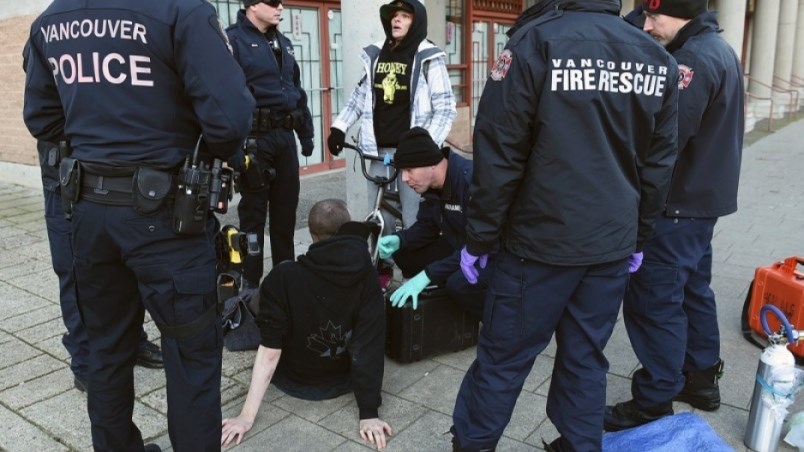Port Coquitlam is now the centre of the Tri-Cities’ overdose crisis, new BC Coroners Service figures reveal.
In previous years, Coquitlam had the dubious distinction until the coroners service began publishing information about illicit overdose deaths in more detail.
Now, the data shows that 12 people have died in PoCo, compared to nine in Coquitlam and three deaths in Port Moody for a total of 24 deaths up to April 30, 2021.
The news gets even worse as coroners’ figures show overdose deaths in the Tri-Cities have tripled since 2016 when a public health emergency was declared.
Today, the rate of illicit drug toxicity deaths (deaths per 100,000 person-years) is 27.6 compared to 9.4 four years ago.
The overdose deaths come despite efforts to provide information about the toxic drug supply and to encourage people not to use alone, drug deaths are on a terrible trajectory upward compared to last year.
COMMUNITY EFFORTS CONTINUE TO BATTLE OVERDOSE CRISIS
The news also comes as community efforts ramp up to support people who are using and to raise awareness about how to prevent deaths with Naloxone.
Last month, the Last Door Recovery Centre released the Better app that allows people using drugs to connect with those who can support them, while an SFU student is working on a project to educate young people about overdose deaths and how to prevent them.
Chloe Goodison recently received $5,000 from Coquitlam accountant Sharon Perry to continue her work on NaloxHome educating Tri-City students about B.C.’s toxic drug supply and what to do about it.
The Tri-Cities Overdose Community Action Team is also working on the issue, providing resources and information.
Still, the picture is grim but it’s very personal and emotional for families who are dealing with deaths of their loved ones.
Recently, Port Moody councillor Diana Dilworth spoke about her son, Tyler, and how he struggled with cocaine use until he died of a poisoned drug, while a Port Coquitlam mom recently talked about her son who sought recovery but relapsed and died.
Both men were young: Dilworth’s son was 31, and he died from a fatal dose of cocaine cut with carfentenil. Kathy Wagner’s son, Tristan, was 21, and died of cocaine poisoned with fentanyl.
Some have speculated that the COVID-19 pandemic has worsened B.C.’s overdose crisis with more people using straight fentanyl while in other cases people’s drug supply is toxic.
The BC Medical Journal published an interview for medical health purposes on the impact of the pandemic on B.C.’s drug supply and how health care workers should respond.
WHY IS THE OVERDOSE CRISIS IN B.C. GETTING WORSE?
The article by Dr. Nickie Mathew, James Wong, and Dr. Reinhard Krausz summarizes an interview with a convicted drug dealer who found selling fentanyl and crystal meth very lucrative because demand was strong, especially from people who became tolerant of the current drug supply and wanting something stronger.
“In the free market of the illicit drug trade, PWUD (people who use drugs) are specifically asking for higher-potency opioids and suppliers are filling this demand.”
“If patients who use drugs intend on using drugs without fentanyl, they should be encouraged to have their drugs tested, and drug-testing sites should be expanded,” the article suggests.
Pandemic cash handouts in the form of the Canada Emergency Response Benefit (CERB) may have encouraged people to buy more drugs, however, it also provided them with money for food and rent, the article notes.
“Any evaluation of the CERB program and safe prescribing guidelines should specifically measure the unintended consequences of allowing increased access to a toxic drug supply for PWUD,” the article states.
Meanwhile, the BC Coroners Service is continuing to raise the alarm.
"Once again, we're reminded that the scale of this public health emergency is truly unprecedented," said Chief Coroner Lisa Lapointe.
"I offer my heartfelt condolences to every family in the province that is experiencing the unimaginable pain of sudden and unexpected loss. Every life lost to toxic drugs in our province is a profound tragedy. Every one of them mattered, and every one of them will be missed."
In B.C., there were 176 lives lost in April, representing a 43% increase over the number of deaths reported in April 2020.
This is the 14th consecutive month in which more than 100 British Columbians have died from suspected illicit drug toxicity and raises the provincial rate of deaths for 2021 to 39.3 per 100,000 residents, according to the coroner.



